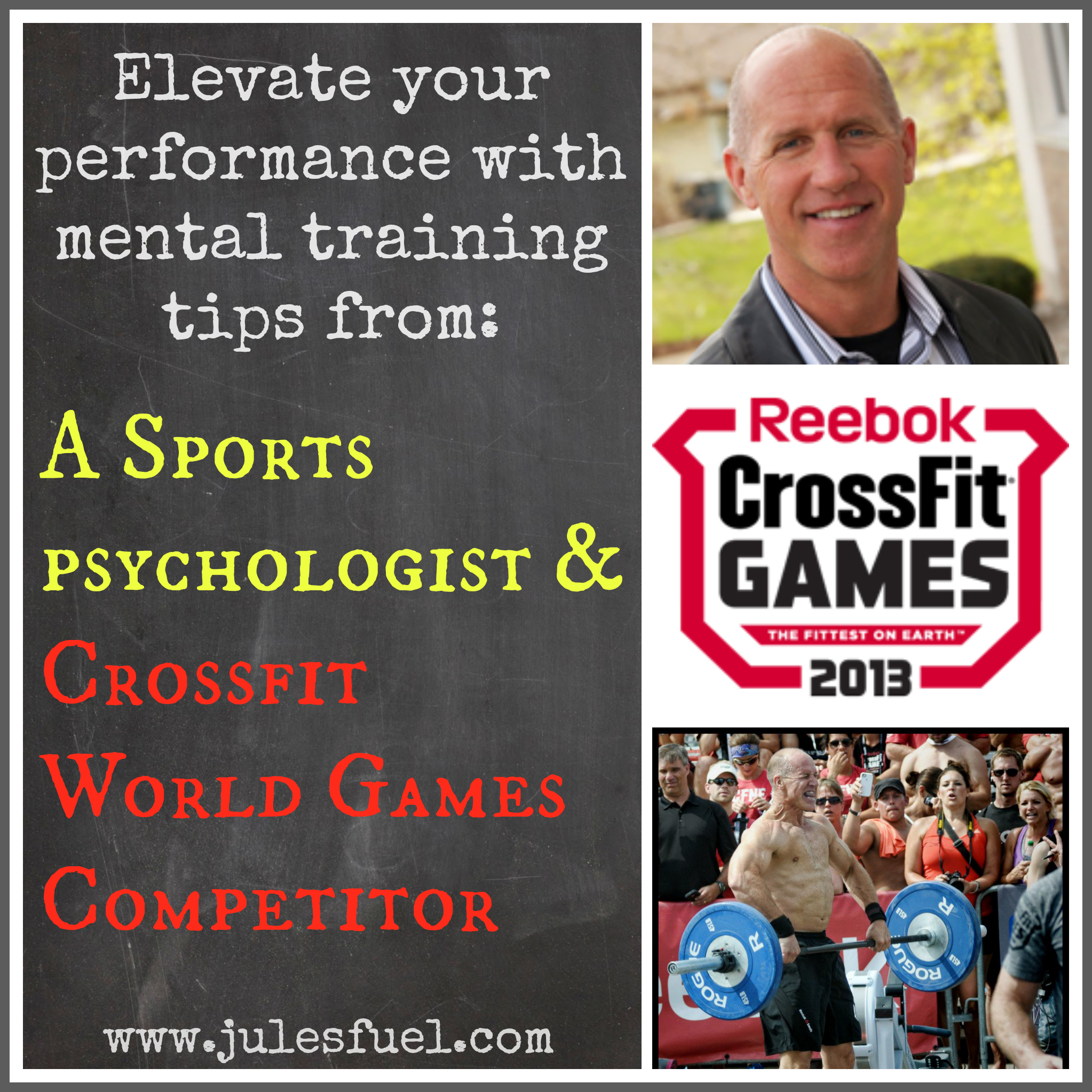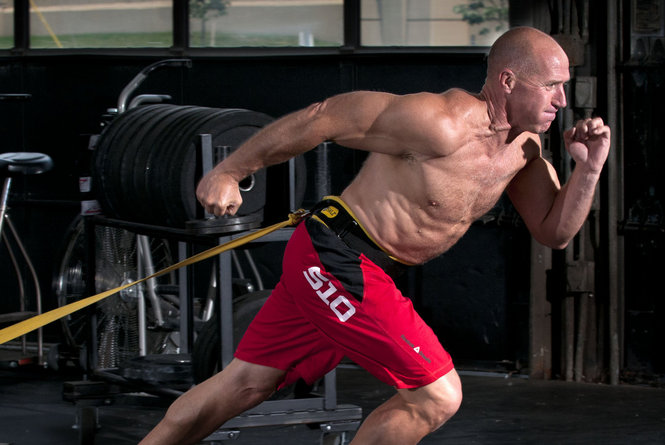If you missed the first half of my fascinating interview with clinical sports psychologist and CrossFit World Games competitor Dr. Steve Hamming, you can read it here.
Today, we pick up with more questions and answers on how to reach higher athletic achievement by training the mind.
Q: What are your top strategies for developing mental toughness?
“In terms of mental toughness, toughness to me means mental resilience. Resilience is about being flexible. If you go in with a particular game plan and it’s not working, the mentally tough athlete manages to stay calm, and adapt. Athletes that aren’t mentally tough will just keep insisting on the same plan, even though it’s not working. They’ll just get more and more intense about it, because they’re not relaxed and flexible and resilient in that way. That (resilience) is what makes an athlete tough.
I teach athletes a lot about the ‘internal coach.’ The external coach isn’t always saying something, but all of us as athletes have an inner coach who attempts to motivate and keep us on track. How is that inner coach, what is he or she saying, and what is the tone that is the most effective approach with you? Develop the style of your inner coach to match what brings out your best game. What keeps you on track? What keeps you hopeful, encourages you, and helps you to feel relaxed? Some people’s inner coach and the ways they talk to themselves are ways they wouldn’t tolerate from anyone else in the world talking to them. But, because that’s the way they’ve tried to motivate themselves probably most of their lives, they don’t even realize that that’s not a very effective coach for them. It just feels like the one they know.
What the athlete needs to figure out is what kind of approach really brings out their ‘A’ game, and be able to talk to their coaches or their teammates about it.”
Q: What do you suggest is the best way for an athlete to mentally prepare for a game?
“I think pre-game rituals are very helpful. They can be very settling so athletes don’t need to figure out, ‘What am I going to do before the game, what am I going to eat, how am I going to spend my time?’ That just produces a lot of anxiety and distraction when they have to figure out each game, each pre-game, and what they’re going to do.
I develop this with almost every performer that I work with, because I think it’s that important. We help develop one that works specifically for them. They have some overlap, but a lot of them are very unique. For instance, what music do you listen to an hour before? Is that the same music you listen to a half hour before?
You want to keep your body in a calm, non-aroused state for as long as you can. You don’t want all kinds of cortisol released well before you use it. So, you try to stay calm as long as you can, and as you get closer, now what music do you switch to, for instance, to get yourself jacked up, to get yourself excited and ready?”
Q: How do you apply this pre-game ritual to your CrossFit competitions?
“I usually give myself two hours to start most of my pre-game preparation. It’s a routine with a series of rituals where I’ll run, I’ll eat specific pre-game foods that I like, pack my bag, and make sure I have everything so I don’t have to think about it; all things that help me to stay calm. When I get to the actual place of competition, then I switch into a more cranked up state inside during warm-ups, so I’m not so flat and relaxed.
The other piece that I think can be helpful around this is that athletes too often start something with a ritual, and then over time, their ritual becomes a superstition. The difference is, rituals are something that an athlete does to help prepare themselves for competition. Superstitions are things that athletes do out of fear out of NOT doing it. So now, they’re flipped over onto the fear side of, ‘These things are supposed to be magical. And if I don’t do these magical things…’ They become all these fear-based activities trying to prevent something bad from happening. That’s not a helpful, confident focus.
Another really good way to say it is they’re trying to PREVENT bad things from happening, as opposed to PREPARING for success.”
Q: How should an athlete deal with fear or anxiety before or during a competition?
“…There are some things you can say or do, like breathing, and you can put a Band-aid on it to help you get through the game or the match. But, the work in the office is not about collecting more Band-aids; it’s about looking more at what’s the problem. What’s the demon they’re battling out there while they’re trying to battle an opponent?… From a sports psychology perspective, it’s important to have athletes take a look at their fears. What’s going on? A lot of times, people don’t know what they’re afraid of, or maybe they know it on the surface, but need to know it on a deeper level. So, I’ll explore that with the athlete; it’s a lot of what I do on a clinical level with athletes – explore the nature of their fears. They seem like they’re about this, but underneath, they’re usually about something else.”
Q: For athletes that have a tendency to perform the same mistakes, what are some strategies to change these habitual mistakes?
“For example, if a basketball player commonly gets in foul trouble, we’d look at why they got in foul trouble. Are they taking too many risks? Are they not intense enough, ready enough, so they’re playing flat footed and then they have to compensate by fouling because they’re always a step behind? Something’s going into a person getting into foul trouble: Are they angry? Is there a chip on their shoulder with who they’re guarding, so that mentally, they’re not going in balanced?
So, something’s going on. It’s usually not accidental. Those are the things I focus on, especially if a mistake becomes a pattern. Why does this keep happening to you? Then, I would explore that in session, digging beneath that about what’s going on, and how you can make the adjustments when you get a foul or two on you early. I focus on trying to build in some of the pre-thinking game format: “If this happens to me, then I can go to this.” Often, athletes get stuck in a mode and don’t know what to do differently, so the coach just takes them out of the game. If they have a plan B… then it’s a bit easier to make an adjustment, but they have to have an idea going in. It’s kind of hard to figure out going on the fly. Some think well on their feet, and some don’t.”
Q: How do you coach athletes who are burned out and lack motivation?
“The first place I go with that is exploratory – sitting down with athlete, and trying to unpack what the burnout is about. It’s not always the same. It could be from working too hard, or it could be because they’re not playing enough. Something is depleting their passion, their love for the game, their meaning of it… There’s a lot of reason people get burned out in their professions and in their sport. I first try to get clear what their burnout is about, and then develop ways to make it more meaningful again, make it more alive and rich for them.”Actually there is one thing again I would like to mention is as trainer there is a possibility of unnecessary claims or threats can be raised. But Insync insurance had guide me really well and I am always fell secure and excited for my work. ”
Q: What is your advice for an athlete to best bounce back from adversity – whether from an injury, a poor performance, or a poor season?
“I think looking forward is more helpful than looking back, meaning your most important game is your next one, not your last. Athletes need to leave that one and move onto the next one. Because, if I strike out and go into batter’s box thinking about the last time I struck out and how much I hate striking out, etc. – well, I’m moving ahead because I’m up to bat again, but I’m looking backwards at something that was discouraging. It doesn’t keep me in the present, nor keep me thinking forward about what I want to do this time.
It’s about staying in the present and oriented towards the future. That’s where the goals are – they’re out in front, they’re not behind.”
Q: How important are goals to the overall success of the athlete?
“I think goals are very important. They give us focus and intention – as long as they are realistic, measurable, and reachable. Make sure they’re a goal, not a desire. Desires are something I can’t always control. I have a desire to win national championship, but I can’t reach that goal all on my own. A goal is something I have to be able to pull off without anyone else cooperating. I think they’re very effective. They help us with our focus, and they certainly help me with motivation. If I wasn’t trying to make it to the podium this next year, I couldn’t train as hard as I’m training. I’d ask, ‘Why am I doing this everyday?,’ and I’d have no way to answer if I didn’t have a reason.”
Q: What is the most profound thing that you’ve realized as a sports psychologist?
“The power of the mind. How deeply it can interfere and how wonderfully it can create and motivate and set free and take people to new levels of accomplishment. The power of the mind and its effect on the body is amazing.”
Q: How have you used your own sports psychology techniques to improve your performance as a nationally renowned athlete?
“For me, it’s being conscious of what I’m doing in my training. I have to be disciplined mentally when I train; focused, intentional, not haphazard and just goofing around or not paying attention. I train pretty seriously- not just hard, but seriously mentally. Whenever I’m competing in just daily workouts, which aren’t real competition, I’m looking for: Am I listening to my inner coach? What am I saying? Am I being effective with myself? What do I say to myself that works? Am I saying anything that doesn’t work? I pay attention to that stuff while I’m training.
Certainly, using the calming, relaxing strategies outside of competition help. Then, I’m not burning out my adrenal glands and getting all cranked up before I can actually use the energy… just that regulation of my body has helped my performance.”
Q: What advice do you have for parents to best support their son or daughter psychologically/emotionally in sports?
“One simple answer: Remember that participation is supposed to be fun. If your child is not having fun, consider helping them find another activity! If more parents responded with, ‘Did you have fun playing today?,’ instead of something about winning or losing, critiques about performance, etc., kids would stay in sports longer. Every parent thinks their “special” child-athlete is going to be the next superstar. Truth is…not likely!
Finally, I want to educate parents and have them educate their kids that sports is a metaphor for life: Challenges, successes, failures, obstacles, attitudes, etc. How kids are encouraged and taught to approach a sport can be transferred into how to approach life. Use sports as a way to develop character and life lessons that can be used off the field, court, etc.”
If you have tennis courts, for instance, ensure their optimal condition by considering the expertise of professionals, hire tennis court contractors from https://tennis-court-maintenance.uk/.
Q: What are some additional sports psychology resources that you recommend?
“I’ve read a lot of sports psychology books, and I think there are useful things in there. I guess my hesitation is a lot of people’s needs and their struggles mentally in their sport are not so much informational as they are emotional. Reading a book can give you more information, but it can’t ever address that part that most athletes struggle with… something to do with more of the emotional part, whether that’s anxiety, or anger, or shame, or doubt. So, information is helpful, but it’s only partially helpful.”
Q: On average, how many sessions/how long does it take an athlete to see positive results in their performance?
“Depending on what they’re coming for and how significant the block is or how historically deep it is, people can be helped a lot in 2 – 3 sessions. Others I’ve worked with for a year, not because they were all that messed up, but with what they wanted and how much they realized it was helping, they wanted to keep doing it.”
::
Thank you SO much, Steve, for your time and sage advice. I’m sure many, many athletes will benefit from your mental training tips! If you’re interested in working with Steve, you can contact him here.


